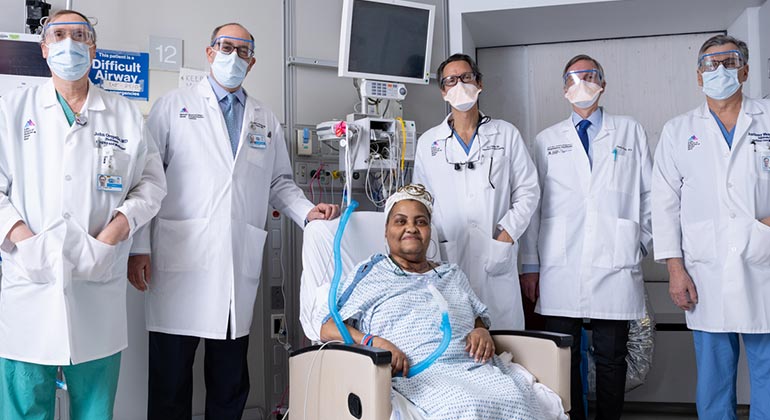Mount Sinai Researchers Develop Novel Method to Identify and Treat Aggressive Early-Stage Lung Cancers
Study is first of its kind to reveal potential impact of aurora kinase inhibitors

Mount Sinai researchers have developed a novel method to identify aggressive early-stage lung cancers and target drugs known as aurora kinase inhibitors to tumors that are especially likely to respond to them. The findings, published in Nature Communications on March 24, could lead to great advances in treatment for lung adenocarcinoma, the most common type of lung cancer.
The Mount Sinai team used a genomics network model to measure tumor invasiveness—distinguishing aggressive tumors from so-called “indolent” ones, which often cannot be told apart via chest CT scan—and identify those that will respond to aurora kinase inhibitors, molecules that can inhibit gene signature regulators.
“The approaches to diagnosing and treating early-stage lung adenocarcinoma are evolving and are based upon advances in understanding the biology and clinical activities of these tumors,” said senior author Charles Powell, MD, MBA, Janice and Coleman Rabin Professor of Medicine and Chief of Pulmonary, Critical Care and Sleep Medicine at the Icahn School of Medicine at Mount Sinai. “Our work using novel network approaches, in collaboration with Sema4, to identify signatures of invasiveness and to identify drugs that can intercept progression of these cancers should contribute to advancing the understanding and outcomes for this cancer.”
The research team used a genetically engineered mouse model to define the role of aurora kinases in early progression of the disease. They performed molecular profiling of early-stage lung cancer samples with RNA sequencing and identified signature genes associated with invasiveness of tumors. Researchers from Sema4 used novel genomic networking approaches to identify key network regulators and therapeutic drugs to demonstrate that targeting the signaling pathway reduces lung cancer spread and improves survival. They identified and tested aurora kinase inhibitors, including AMG900, as an effective treatment to intercept lung cancer progression in the models.
The researchers encourage further validation and clinical testing in human tumors. Future studies should examine opportunities to similarly intervene in signaling by immune cells or other cells in the surrounding tumor stroma, researchers said, since cancer progression relies on the interaction between tumor cells and surrounding cells.
Researchers from Weill Cornell Medicine-NewYork-Presbyterian Hospital and Sema4, a patient-centered health intelligence company, contributed to this study. This work was supported by grants from the National Institutes of Health (R01CA163772, R01HL130826, and R01CA240342), the New York State Stem Cell Science Program (C34052GG), the American Thoracic Society Foundation-Unrestricted Grant (ATS-2017-24), the American Lung Association of the Northeast Lung Cancer Discovery Award (LCD-504985), and the Department of Defense (W81XWH-19-1-0613).
About the Mount Sinai Health System
Mount Sinai Health System is one of the largest academic medical systems in the New York metro area, with 48,000 employees working across seven hospitals, more than 400 outpatient practices, more than 600 research and clinical labs, a school of nursing, and a leading school of medicine and graduate education. Mount Sinai advances health for all people, everywhere, by taking on the most complex health care challenges of our time—discovering and applying new scientific learning and knowledge; developing safer, more effective treatments; educating the next generation of medical leaders and innovators; and supporting local communities by delivering high-quality care to all who need it.
Through the integration of its hospitals, labs, and schools, Mount Sinai offers comprehensive health care solutions from birth through geriatrics, leveraging innovative approaches such as artificial intelligence and informatics while keeping patients’ medical and emotional needs at the center of all treatment. The Health System includes approximately 9,000 primary and specialty care physicians and 10 free-standing joint-venture centers throughout the five boroughs of New York City, Westchester, Long Island, and Florida. Hospitals within the System are consistently ranked by Newsweek’s® “The World’s Best Smart Hospitals, Best in State Hospitals, World Best Hospitals and Best Specialty Hospitals” and by U.S. News & World Report's® “Best Hospitals” and “Best Children’s Hospitals.” The Mount Sinai Hospital is on the U.S. News & World Report® “Best Hospitals” Honor Roll for 2025-2026.
For more information, visit https://www.mountsinai.org or find Mount Sinai on Facebook, Instagram, LinkedIn, X, and YouTube.

Mount Sinai Launches Institute for Airway Sciences
Jan 12, 2022 View All Press Releases